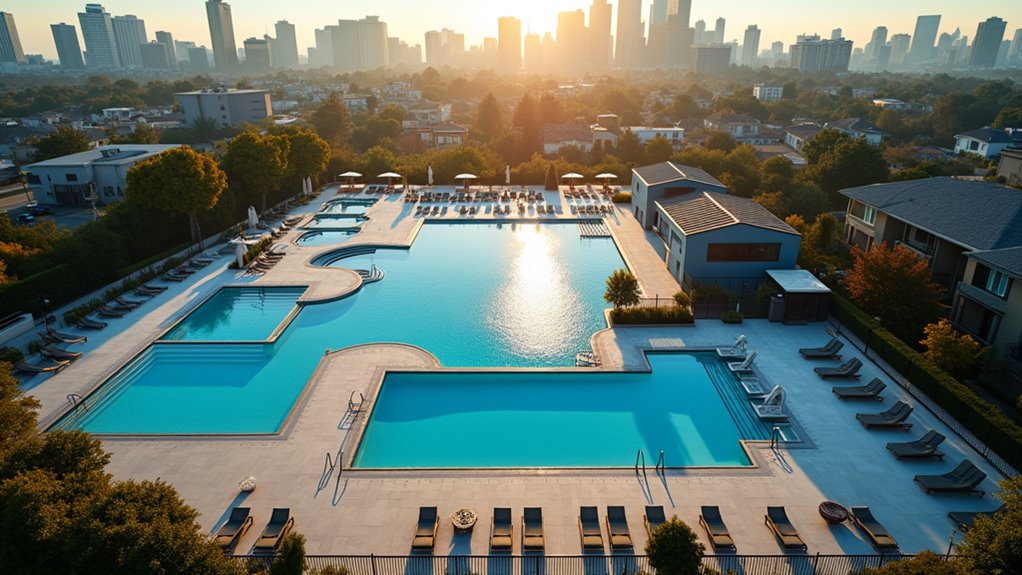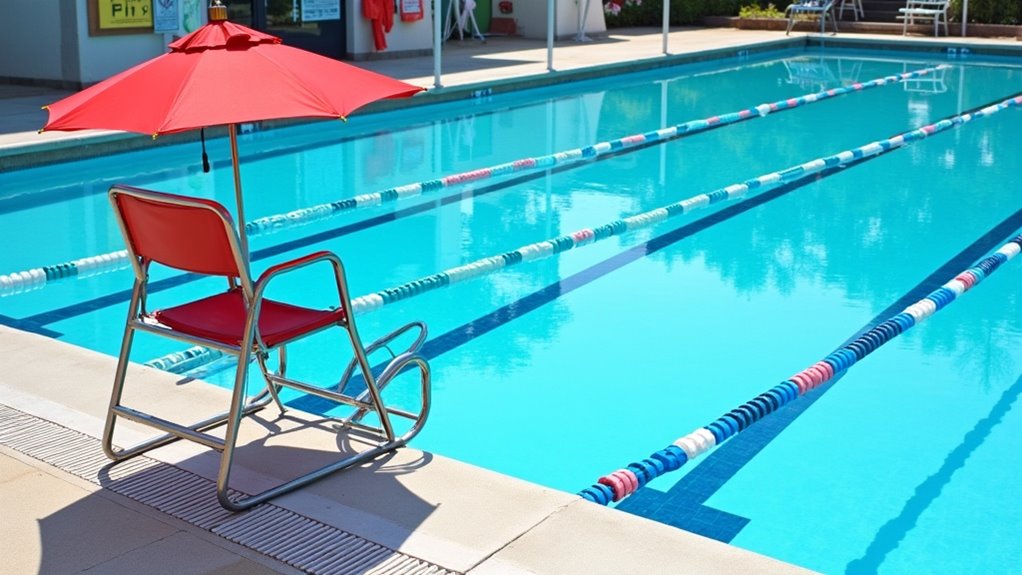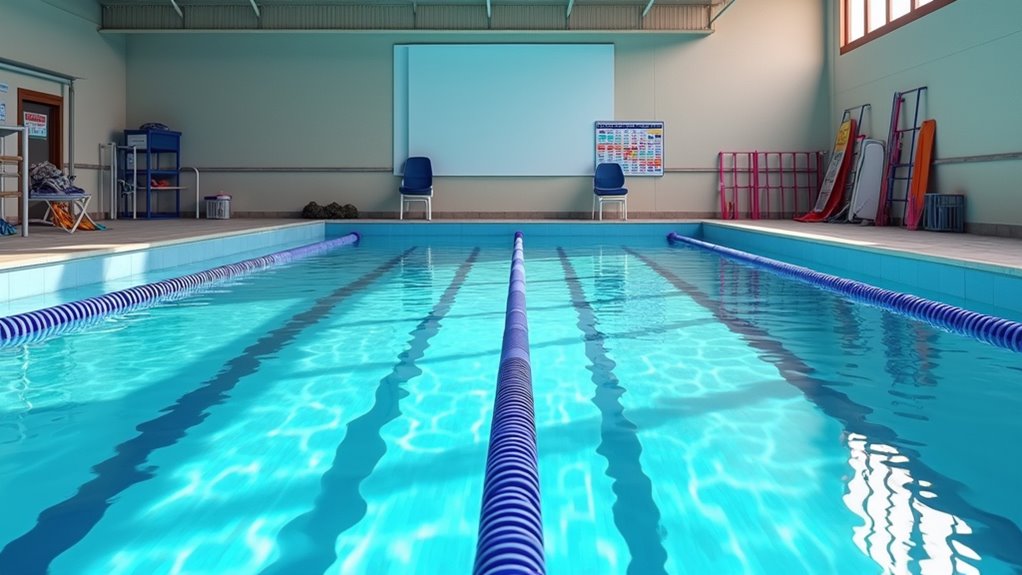Your 2025 pool season guide covers essential scheduling across major U.S. cities, with detailed facility hours and program timelines. You’ll need to follow strict safety protocols, including proper supervision and capacity limits. Most pools operate from Memorial Day through Labor Day, offering scheduled activities like lap swim, lessons, and special events. Registration deadlines and membership requirements vary by location, so you’ll want to check your facility’s specific guidelines. The complete breakdown will help you make the most of pool season.
Key Pool Season Trends Across Major U.S. Cities

Several major trends are reshaping pool facilities across U.S. cities, with sustainability and wellness features leading the transformation. You’ll find energy-efficient equipment, including variable-speed pumps and automated water management systems, becoming standard despite ongoing supply chain challenges. Slip-resistant features on steps and ledges are now essential safety elements, especially in public facilities.
Sustainability initiatives in pool design now emphasize eco-friendly materials like recycled glass tiles and drought-resistant landscaping. You’re also seeing an increase in health-oriented features, from cold plunge spas to resistance jets for aquatic exercise. Smart technology integration lets you control pool functions remotely while maintaining ideal efficiency. Saltwater systems are increasingly replacing traditional chlorine pools due to their lower maintenance requirements and gentler effect on swimmers. While year-round operations have decreased from 61.2% to 58.3% since 2022, facilities operating throughout the year consistently report higher average operating costs.
Modern designs favor sleek, geometric shapes with continuous floor patterns and built-in seating. These elements work together to create more sustainable, wellness-focused facilities that operate efficiently year-round, particularly in southern regions where extended seasons are common.
Understanding Local Pool Hours and Operations
While modern pool facilities adopt novel designs and technologies, their daily operations follow carefully structured schedules to guarantee safety and accessibility for all users. You’ll find that most pools segment their day into specific activity blocks, including lap swim, open swim, and facility maintenance schedules. For example, this facility designates Water Fitness classes from 9 AM to 10 AM before transitioning to open swim hours.
Operating hours vary substantially by location and season, with many facilities adjusting their schedules based on daylight hours and local demand. You must check your pool’s inclement weather policies, as temporary closures may occur with minimal notice. Keep in mind that membership status can affect your access times, with some facilities offering exclusive hours for members.
Watch for posted schedules at facility entrances and online calendars to stay informed about maintenance breaks, special events, and seasonal changes that might impact your swim time.
Essential Safety Guidelines and Supervision Rules

Safety at swimming pools demands rigorous attention to established guidelines and supervision protocols that protect all users from potential hazards. You’ll need to follow these critical requirements to guarantee a safe swimming environment:
Pool safety requires strict adherence to protocols and constant vigilance to create an environment where swimmers can enjoy the water without risk.
- Never leave swimmers unattended; assign a dedicated Water Watcher who’ll maintain constant, active supervision without distractions. Walk carefully around the pool area to prevent dangerous slips and falls on wet surfaces.
- Verify that your pool has proper barrier controls, including four-sided fencing with self-closing gates and functioning alarm systems
- Complete regular equipment inspection protocols, checking drain covers, suction outlets, and safety equipment while maintaining chemical safety procedures for proper pH and disinfectant levels. Proper handling and storage of pool chemicals is essential, as misuse leads to thousands of preventable emergency room visits annually.
- Necessitate all swimmers understand and follow posted rules, with non-swimmers using Coast Guard-approved life jackets and everyone completing basic water safety training
As unintentional drowning remains the leading cause of accidental deaths for children ages 1-4, maintaining strict supervision and safety measures is absolutely critical.
Registration Requirements and Capacity Management
Proper registration and capacity management serve as the foundation for maintaining organized, compliant pool operations throughout the 2025 season. You’ll need to submit your New Registration Form and fees before scheduling any opening inspections. While waiting list procedures aren’t available, memberships operate on an initial basis, with no priority given to previous members. The convenient Funfangle system enables quick digital member check-ins at entry. Facilities must display their bathing load capacity prominently near the entrance in letters at least 4 inches tall.
For 2025, you’ll find a streamlined digital check-in process replacing physical membership cards. Pool schedules include staggered swim sessions to optimize staffing considerations and prevent overcrowding. Remember, your household membership covers only residents at the same address. The online licensing portal offers the fastest renewal method for pool registrations. All facilities must maintain current contact information and accessibility for inspectors, particularly during off-hours. Annual renewals are due before April 30, with notices typically sent by March 1.
Swimming Programs and Special Event Scheduling

Throughout the 2025 pool season, you’ll find detailed swimming programs designed to serve all skill levels and demographic groups. With adaptive programming for special needs and community partnerships for pool upkeep, facilities guarantee safe, accessible aquatic experiences for everyone. The Aquatics Division manages 25 total pools across the city, including both outdoor and indoor facilities. Swimmers can access the Olympic-style pool at Corpus Christi Natatorium for competitive training and conditioning. Pools feature exciting amenities including 48-inch height requirement slides for thrill-seeking swimmers.
Your seasonal program options include:
- Multi-week lesson sessions from June through August, featuring beginner to advanced instruction and lifeguard certification courses
- Daily fitness classes, including morning lap swim, water aerobics, and specialized rehabilitation sessions
- Competitive swim leagues with scheduled meets and age-specific divisions throughout the summer
- Special events like Memorial Day celebrations, family fun nights, and cultural water festivals
You’ll need to register early for popular programs, as capacity limits ensure proper instructor-to-participant ratios and ideal safety conditions.
Frequently Asked Questions
What Happens if My Child Gets Sick During Swim Lessons?
If your child becomes ill during lessons, they’ll need to exit the pool immediately to prevent contamination. You should notify staff right away so they can take appropriate safety measures. Depending on symptoms, especially vomiting or diarrhea, the pool may require temporary closure for disinfection. Make-up lessons are available when you communicate with staff about illness-related absences. Keep your child home until they’re completely recovered to protect everyone’s health.
Can I Bring My Own Pool Floats or Water Toys?
Most pools don’t allow personal floats or large water toys for safety reasons. You’ll need to check your specific facility’s rules, as policies vary. Generally, you can bring small swim aids like goggles, kickboards, and infant floaties, but larger inflatables are typically prohibited. This policy helps lifeguards maintain clear visibility and guarantees everyone’s safety. If you’re unsure, contact your pool’s staff before bringing any equipment; they’ll guide you on what’s permitted.
Are There Designated Areas for Photography Around the Pool?
You’ll need to check your specific pool’s photography policies before taking pictures, as rules vary widely by location. Some facilities designate photo-friendly zones, while others prohibit photography entirely. Many public pools require photography permit requirements for any image capture on premises. For your safety and others’ privacy, always look for posted signage and ask staff about current guidelines. Don’t forget that commercial photography typically needs special authorization.
What Types of Food and Drinks Are Allowed in Pool Areas?
You’ll find that most pools strictly regulate food and drinks for safety reasons. You can typically bring sealed plastic water bottles and non-glass containers, but you’ll need to consume them in designated eating areas away from the pool deck. Food safety regulations usually prohibit glass containers, alcohol, and cans. Some facilities offer concession stand options, but you’ll still need to eat in specified zones, usually 4 feet or more from the water.
How Do Pools Accommodate Visitors With Special Medical Conditions or Devices?
You’ll find extensive disability accommodations at public pools, including ADA-compliant lifts, sloped entries, and transfer systems. Most facilities have medical equipment policies that allow waterproof devices like insulin pumps and portable oxygen. You’re welcome to use mobility aids and prosthetics in the pool area, and you’ll have access to trained staff who can help with transfers and equipment setup. Special changing areas and accessible locker rooms are also available for your privacy and convenience.






